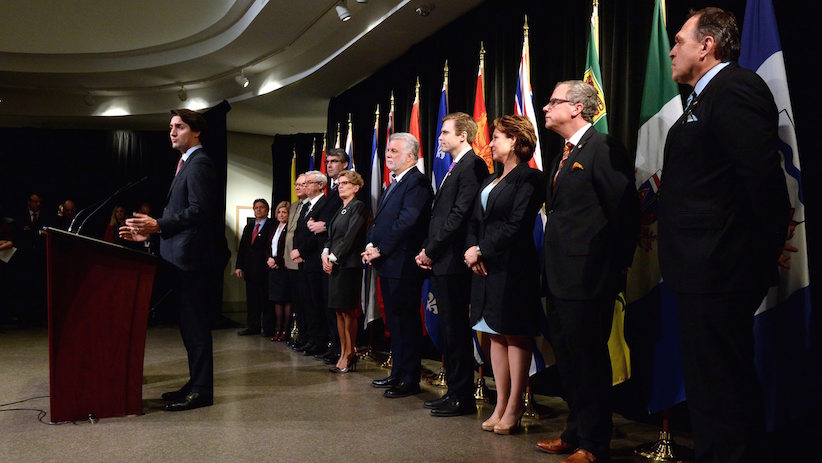How Ottawa and the provinces can unite around climate change
As Trudeau prepares to meet with the provinces this week to discuss a national climate change plan, the big question is around what role Ottawa will play
Share

First Ministers are meeting this week to talk about climate change action. A number of them went to Paris last December and shared the spotlight with Prime Minister Justin Trudeau where he confirmed that Canada’s 2030 GHG emissions target would be 524 Mt—a 30 percent reduction from 2005 levels. Now all First Ministers have to do is figure out is how to get there from here. Simple, right?
To help get them started, we prepared some notes laying out the basic arithmetic of Canada’s climate change challenge and walking them through the tricky issues surrounding sharing the burden of transforming Canada into a low-carbon society. A final set of issues we need to address involves the ‘plumbing’ of federal-provincial collaboration. Specifically, we need to consider the federal role and how collaboration could be accomplished. Here is a summary of our latest thinking on how to move forward.
Like the rest of the world, the fundamental challenge that Canada faces is to transform itself into a low-carbon society between now and 2050. This will occur through changes to incentives (examples: carbon and traffic congestion pricing), regulations (examples: building codes and vehicle fuel efficiency regulations) technology (examples: electric vehicles, renewable energy), infrastructure (examples: rapid transit, bike lanes) and culture (examples, walkable cities, virtual meetings). What roles should federal and provincial governments play in driving these changes? Who should be accountable?
Provinces have already taken the lead in some areas. Critically, Canada’s four largest provinces representing 80 percent of Canadian emissions have existing or proposed carbon pricing systems. Carbon taxes are being used in B.C. and are proposed for Alberta. Cap and trade is working in Quebec and proposed for Ontario. The federal Liberal party committed to carbon pricing in its 2015 election platform and, having now formed government, has started work on that commitment.
The federal government has a number of roles it can play. It has already confirmed Canada’s 2030 GHG emissions target in Paris. It convened First Ministers for a seminar on climate science in November and has scheduled a second meeting for March 3 in Vancouver. It has committed to help fund new infrastructure to aid in the transformation.
The big unanswered question is: how does the federal government intend to proceed on carbon pricing? Will it try to impose a carbon tax or cap and trade system uniformly across the country? Or alternatively, will it play the role of ‘system integrator’, connecting provincial programs to form a system that will meet Canada’s 2030 target?
Fortunately, there are a number of existing examples of federal-provincial collaboration on environmental matters. Canada and Nova Scotia have an ‘Equivalency Agreement’ on regulating GHG emissions from coal-fired electricity plants. The Canadian Environmental Protection Act allows for the substitution of provincial for federal regulations as long as the provincial regulations achieve the same environmental outcome, and allow citizens the same rights to request investigations of possible violations.
Canada and the provinces recently agreed on a Canada-wide ‘Air Quality Management System’ based on a ‘backstop’ approach. Provincial regulations for air pollution will be slightly more stringent than federal ones, allowing provinces to be regulator of first instance, while the federal government retains the right to enforce its regulations in the face serious, repeated violations.
How could federal-provincial carbon pricing collaboration work? To start, the governments could collaborate on the economic modeling required to estimate the carbon price consistent with Canada’s 2030 target of 524 Mt. Provinces with carbon taxes could agree to set their tax rate at that level, or if they are running a cap and trade system, accept a carbon allocation consistent with an appropriate burden sharing scheme.
Equivalency agreements or backstop arrangements would allow provinces to be regulators of first instance and to recycle the revenues from the tax or carbon auction to cut other taxes or finance the transformation to a low-carbon society. Provinces would need to allow the trading of carbon allocations (if they used a cap and trade system) or offsets (if they used a carbon tax) with other provinces to ensure that firms had access to the lowest cost emissions reductions available.
Can the federal government and provinces collaborate successfully to meet our 2030 emissions target? Of course they can—they already have a history of effective environmental collaboration to build on. Key federal roles include ‘target setter’, ‘meeting convenor’, ‘transformation funder’ and ‘systems integrator’—connecting the different provincial schemes to form a system to enable our transformation to a low-carbon society. This week, the practical plumbing work begins.
Paul Boothe and Felix Boudreault work at the Lawrence National Centre for Policy and Management. Chris Frankel is an environmental consultant at F&B Advisors. All three authors worked on climate change issues at Environment Canada.